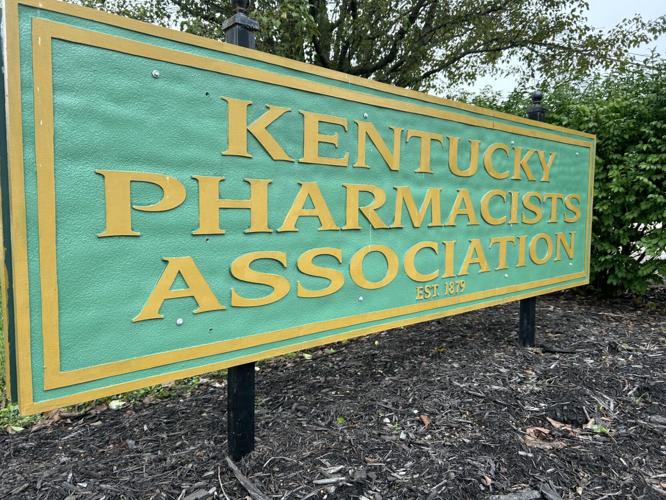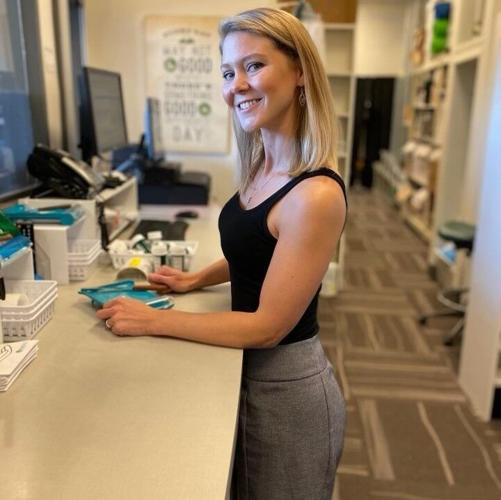LOUISVILLE, Ky. (WDRB) -- Several pharmacists and lawmakers are pushing new legislation they hope will cut down on the price of prescriptions and help keep pharmacies open.
However, not everyone agrees the new bill is the answer.
Lawmakers and independent pharmacists from 10 states, including Kentucky, gathered recently in Washington for a news conference to discuss House Resolution 9096, also known as the Pharmacists Fight Back Act. The bill, which was introduced July 23 in the House, is aimed at implementing a pharmacy reimbursement model to use national averages to drive down the cost of prescription medication. It's focused on the actions of pharmacy benefit mangers, or PBMs, the "middlemen" of drug pricing, the lawmakers allege.
"Healthcare costs continue to rise and we have now found ourselves in a situation where the fox is guarding the hen house," said Ben Mudd, the executive director of the Kentucky Pharmacists Association.
Mudd said issues many pharmacies face largely stem from a lack of transparency from PBMs. There are multiple PBMs, but the three largest are CVS Caremark, Express Scripts and OptumRx. PBMs are third-party companies that manage prescription drug benefits for various health plans. But, according to the Kentucky Pharmacists Association, "PBMs are directly responsible for driving up drug costs, gouging community pharmacists, and limiting patient choice in federal healthcare plans."
The Pharmacists Fight Back Act wouldn't allow PBMs to, among other things:
- Charge a beneficiary more for a prescription drug than the amount of reimbursement made to the pharmacy that dispenses such drug.
- Require a beneficiary to obtain a brand name prescription drug when a lower cost, AB-rated generic version of such brand name drug is available.
The Kentucky Pharmacists Association said this bipartisan legislation is currently the most comprehensive PBM reform ever introduced at the federal level.
None of the three largest PBMs agreed to an interview for this story, instead pointing toward a statement from the trade group, Pharmaceutical Care Management Association:
"This bill would increase pharmacy costs and limit the ability of employers to drive competition and affordability for their employees at the pharmacy counter. The short-sighted provisions will only benefit drugstores and do nothing to lower prescription drug costs for patients. It makes no sense that PBMs are putting pharmacies out of business. PBMs recognize the vital role pharmacies play in creating access to prescription drugs for patients. There are many factors for pharmacy closures, however pharmacy benefit managers are supporting community pharmacies in rural areas through programs that increase reimbursements. Blaming PBMs for pharmacy closures is not based on the facts."

Kentucky Pharmacists Association (WDRB image)
According to the Kentucky Pharmacists Association, the legislation would implement a transparent pharmacy reimbursement model and protect community pharmacists and patient choice by prohibiting PBMs from steering patients to PBM-affiliated pharmacies.
In support of the Pharmacists Fight Back Act, a Sept. 30 op-ed published by Congressman James Comer, R-KY, said "PBMs were first created to benefit the entire health care system. Dozens of large PBMs nationwide competed and initially provided clear details about costs, fees, and rebates to pharmacies and patients. But now, instead of fierce competition, three large PBMs—CVS Caremark, Express Scripts, and Optum Rx—collectively control 80 percent of the market. Today, these three PBMs operate in the dark and engage in self-benefitting practices that line their own pockets and pass the costs on to you."
Mudd said he often hears from multiple members of the Kentucky Pharmacists Association about financial concerns.
"It depends on the pharmacy but it's not uncommon for me to hear from our members in the independent pharmacy world upwards 40% of their prescriptions they fill below cost," he said. "That means they don't even get paid what they pay for the drug."
'Pharmacies are struggling'
Grassroots Pharmacy in Lexington closed this August after serving the community there more than seven years. Owner and pharmacist Shelley Roberts said she just couldn't keep the doors open any longer.
"With the way reimbursements have made it so incredibly difficult to run a business, we knew that this was not a long-term business that we could keep," she said.
Roberts recalls one day getting reimbursed a total of 17 cents for a prescription.
"It costs 13 cents just to receive the prescription from the doctor," she said. "It doesn't cover the cost of the drug. It doesn't cover the cost of the bottle, the lid, the label, the bag that it goes in, the credit card transaction fee when somebody pays their co-pay."
She's also calling on more transparency from PBMs.

Shelley Roberts at Grassroots Pharmacy in Lexington, Kentucky. (Image from Shelley Roberts)
"... and that's why we need this bill is to begin regulating some of the things they do," Roberts said.
It's also been a challenge getting younger professionals interested in the business, Mudd said.
"The general public and young people are seeing pharmacies are closing," he said. "Those are the headlines: Pharmacies are struggling. Nobody wants to go into that profession. We don't get to talk about the positive things that we're doing."
Misty Stutz, dean of the College of Pharmacy and Health Sciences at Sullivan University in Louisville, echoed similar thoughts and said enrollment has dropped in recent years.
"The market says we needs more pharmacists, and, yet, here we are," Stutz said. "This year, we'll have 29 graduates. So that's not near enough to fill the 80,000 jobs nationwide that we have."
Stutz said she's hopeful enrollment will start increasing soon but said admission had dropped from 82 students in 2015 to 50 students in 2019. By 2022, fewer than three dozen students were in Sullivan's Doctor of Pharmacy program. Stutuz said admission for 2024 rose back up to 43, but that's still not where it was less than a decade prior.
Stutz said the Pharmacists Fight Back Act is long overdue and she hopes it leads to more transparency.
"Right now, (the PBMs) don't really fall under the same regulations that insurance companies do, and so a lot of their practices are hidden from the public, from the insurer, from the pharmacy," she said. "And just having it be transparent where people could see and then there be regulations around their practices."
But, again, according to the Pharmaceutical Care Management Association, the bill would increase pharmacy costs. Roberts disagrees with that claim and said while federal legislation didn't come soon enough to save her business, she believes a bill like this could save others.
"It's too late for us and it's too late for a lot of pharmacies. Even the ones that are still in operation, it could be too late," she said. "... It is too late for a lot of us, but that doesn't mean we stop fighting for a bill."
The bill still has a long way to go before it could become law. But a bill in Kentucky related to PBM transparency, Senate Bill 188, passed earlier this year in the commonwealth. That will go into effect in January.
Related Stories:
Copyright 2024 WDRB Media. All Rights Reserved.




